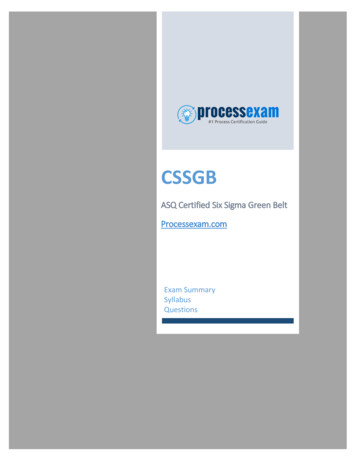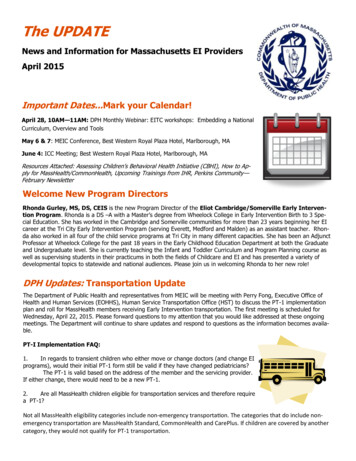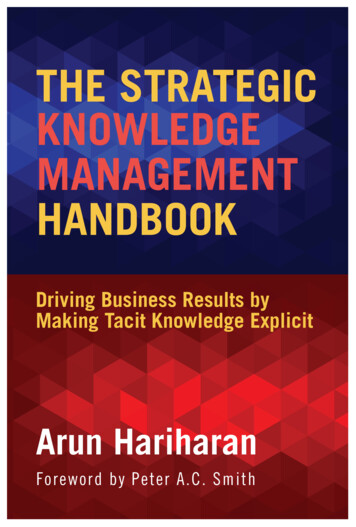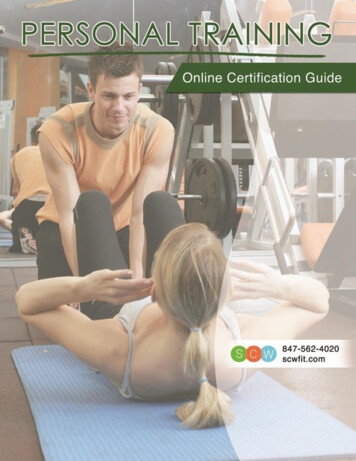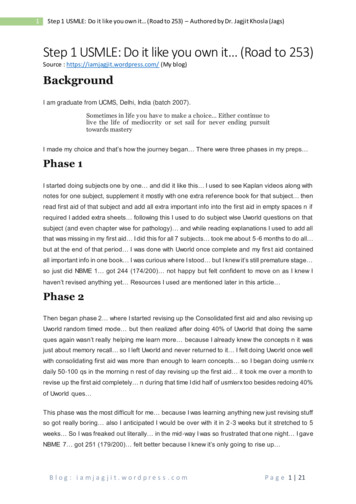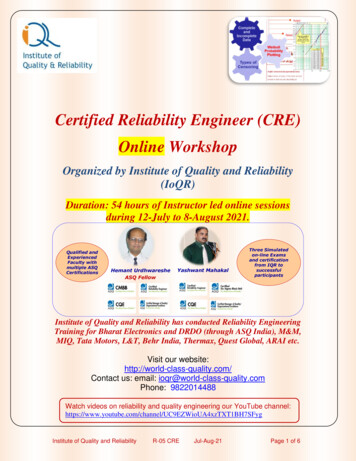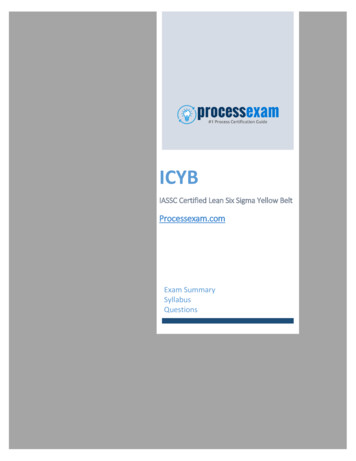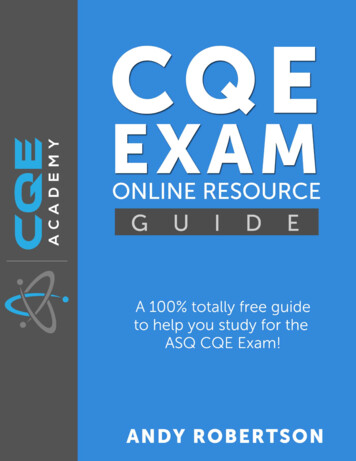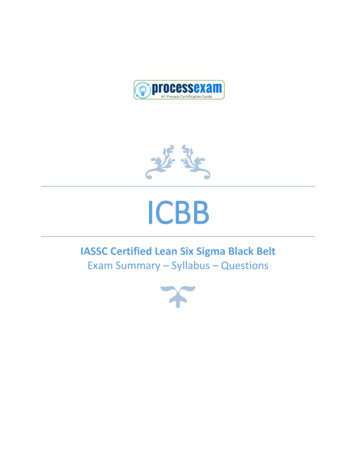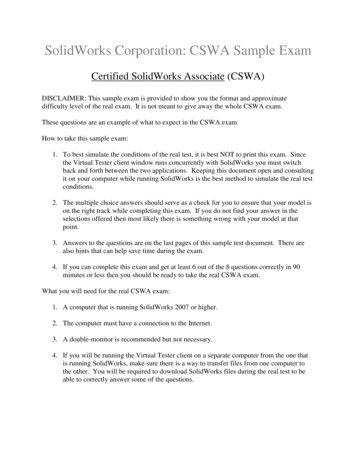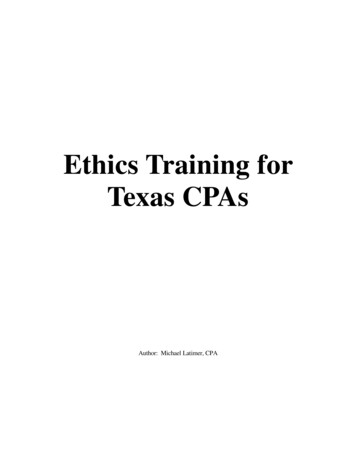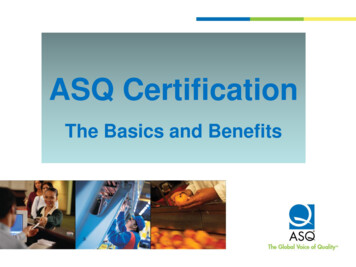
Transcription
ASQ CertificationThe Basics and Benefits
What is certification?What are benefits of certification?Certification historyCertification programsEXAM DEVELOPMENT PROCESSRecertificationExam statsQuestions?2
What is ASQ Certification?ASQ certification is formalrecognition by ASQ that anindividual has demonstratedproficiency in, and comprehensionof, a specified Body of Knowledgeat a point in time.3
ASQ Certification is Internationally accepted andrecognized Recognition as a symbol ofexcellence, for more than 40years Endorsed by over 125corporations4
ASQ Certification is also A marketplace requirement Peer recognition Personal validation5
Key Benefits of Certificationfor Members Acquire new skills and upgradeproficiency Have an additional source ofprofessional and personal pride Invest in their careers6
Key Benefits of CertificationFor Employers A mark of technical excellence Currency with emergingtechnologies Knowledgeable employees -better able to assure product andservice quality7
Key Benefits of Certificationto Organizations An investment in the company’sfuture Perfecting and sharing newtechniques in the workplace A discriminator in the marketplace8
Value of MembershipCertification has been rated oneof the top three most-valuedbenefits of ASQ membershipsince 1991.9
History of Certification Certified Quality Engineer1968 Certified Quality Technician1970 Certified Reliability Engineer1972 Certified Mechanical Inspector1984 Certified Quality Auditor1987 Certified Manager of Quality199510
History of Certification Certified Software Quality Engineer1996 Certified Hazard Analysis and CriticalControl Point (HACCP) Auditor1999 Certified Quality ImprovementAssociate2000 Six Sigma Black Belt2001 CQA-Biomedical2002 Certified Calibration Technician200311
History of Certification Certified Quality Process Analyst Certified Six Sigma Green Belt Certified Pharmaceutical GMPProfessional Certified Master Black Belt200520062009201012
Certification Programs Quality Engineer (CQE)– Principles of product and service qualityevaluation and control Quality Process Analyst (CQPA)– Under supervision, is involved in qualityimprovement projects Reliability Engineer (CRE)– Principles of performance evaluation forproduct/systems safety, reliability andmaintainability13
Certification Programs Quality Auditor (CQA)– Standards and principles of auditing,questions, evaluations, reports forquality system adequacy HACCP Auditor (CHA)– Tests applicants’ knowledge of theHazard and Critical Control Point(HACCP) standards14
Certification Programs Quality Technician (CQT)– Quality problem analysis, inspectionsampling plans, SPC applications Quality Inspector (CQI)– Hardware documentation, lab andcalibration procedures, inspection,process performance, data collectionand reports15
Certification Programs Software Quality Engineer (CSQE)– Development of software processes,measurement, verification andvalidation, analytical methods, andquality management Manager of Quality/OrganizationalExcellence (CMQ/OE)– Champions process improvementinitiatives, supports strategic planningand deployment initiatives16
Certification Programs Quality Improvement Associate (CQIA)– Basic knowledge of quality tools andtheir uses and is involved in qualityimprovement projects Six Sigma Black Belt (CSSBB)– Designed to demonstrate competencyin the use of Six Sigma methodologies17
Certification Programs Biomedical Auditor (CBA)– Understands the principles of standards,regulations, directives and guidance forauditing a biomedical system Calibration Technician (CCT)– Tests, calibrates, maintains, and repairselectrical, mechanical, electromechanical,analytical, and electronic measuring,recording, and indicating instruments andequipment for conformance to establishedstandards18
Certification Programs Six Sigma Green Belt (CSSGB)– A paraprofessional, working with processdevelopment and documentation, collectsand summarizes data, creates andinterprets multi-vari studies Pharmaceutical GMP Professional (CPGP)A professional who understands the GMPprinciples as regulated and guided bynational and international agencies for thepharmaceutical industry19
Initial Activities & Preliminary Steps A Division comes forward with an ideafor a certification program.– Obtains approval of the concept fromthe Certification Board– Conducts a marketing study todetermine potential market– Contracts with outside measurementexpert to conduct job analysis20
ASQ CERTIFICATIONSExam Development Process21
Steps in Test DevelopmentNew Cert.approved byASQ BOD5-year Reviewof ExistingProgramJob AnalysisWorkshopJob AnalysisSurveyTest SpecificationWorkshopEnoughItems pItem yVersionItem Analysisand ScoringChangesYesExam-ReviewWorkshopYesAdminister ExamNoNewBOK?Cut-Score StudyNoScore Exams andNotify Candidates22
Job Analysis Prep The Survey is developed with the helpof an Outside Measurement Expertand involves– Literature Search– Subject Matter Experts– Advisory Committee– Survey Review Panel23
Job Analysis Steps An Advisory Committee identifies– Typical job responsibilities (whatpeople do on their job)– Knowledge base required (whatpeople need to know in order toperform their job)24
Job Analysis Steps cont’d.Advisory committee work results in a surveythat asks respondents to rate each item in thesurvey in terms ofCriticality (how important is this task andknowledge) andFrequency (how often is this task performedor knowledge used)25
Job Analysis Conducted Job Analysis Survey– Mailed to 2000 individuals– Results are summarized– Results are approved by sponsoringdivision– Certification Board Approval26
Job Analysis Study A Job Analysis study is conducted every5 years to ensure the validity of the examprograms. The results of the Job Analysis are used todevelop the Body of Knowledge.27
BOK Development A Body of Knowledge Committee– Consists of 12-15 subject matter experts– Attends a two-day workshop– Primary task is to translate the jobanalysis results into meaningfulcategories that can be tested28
BOK CommitteeThe BOK Committee determines thenumber of questions in each area of theBOK, based on the importance of the topic,as well as the depth of testable material.29
Item Writing 16 subject matterexperts are trained initem writing. Items are written foreach area of the Bodyof Knowledge. 250 items aredeveloped during 2day session.30
Item Review One 2-day workshopper year 12 subject matterexperts review eachquestion for– Accuracy– Clarity– Appropriateness– Diversity31
Exam Review 12 subject matterexperts actually takeeach exam before itsfirst, formaladministration. Every item on the examis reviewed once more. The flow of the entireexam is reviewed.32
Volunteering More than 50volunteersparticipate in thedevelopment ofeach exam.33
Opportunities to Participatein Workshops Item Writing - Write exam questions Item Review - Review the questions Exam Review - Take an actual exam andscore it before it is officially administered34
Selection Criteria for Volunteers Good team and communication skills Exam teams are chosen with a mix ofnew and experienced volunteers Cannot be teaching or authoringexam review materials35
Benefits of Volunteering 1 recertification unit per day ofworkshop volunteering Reimbursement for expenses Visit ASQ HQ and meet Certificationstaff36
Benefits of Volunteering Peer Networking Reinforce and expand subjectknowledge Learn New Techniques from otherProfessionals37
How to Volunteer Contact the Certification Office atASQ HQ 1-800-248-1946or Contact the Division Liaisonresponsible for a specificcertification38
RECERTIFICATIONRecertification verifies that youhave maintained the sameknowledge level you demonstratedwhen you originally passed theexam.39
Who Has to BBCCT40
RECERTIFICATIONIt’s EasierThan YouThink!41
RECERTIFICATIONIn a recent survey of people who hadrecertified, 96% said that therecertification program isunderstandable, and very easy to use.42
Recertification Requirements 18 credits over three years Credits are earned through– Employment– Professional Development– Education– Society Involvement43
Only 18 RU credits - over 3 years!! Employment Professional DevelopmentSeminarsWorkshopsConferences44
Only 18 RU credits are neededover a 3-year period. Instructor– Company, internal instructing– College, university instructing– ASQ exam refresher courseinstructingAny instructing must be above and beyondyour regular job duties and requirements inorder to qualify.45
Only 18 RU credits are neededover a 3-year period!! Education– Company-sponsored in-housecourses (computer skills, teambuilding, etc.)– University/college courses– ASQ-sponsored courses46
Only 18 RU credits are neededover a 3-year period!! Society Involvement– Exam Proctor– Meeting/workshop attendance– Committee member– Officer (national, division, section)47
Just see how simple!! Full-time employment10.8 RUs AQC attendance (once)3.0 RUs Company-sponsored training(e.g., project management,Diversity in the Workplace)4.0 RUs Section Meetings (3 meetings/year) 2.7 RUs20.5 RUs48
RECERTIFICATIONCALL ASQ AT(800)-248-1946orVisit us atwww.asq.org49
Exam StatsGrowth as a result of Translated exams Spanish - CQE, CQA, CQT, CQI, CQIA,CQPA, CCT, SSBB, SSGB Japanese - CSQE, CQE Mandarin - Manager, CQE, SSBB, CQIA Korean - CRE, CQE Portuguese - CQE50
What is ASQ Certification? ASQ certification is formal recognition by ASQ that an individual has demonstrated proficiency in, and comprehension . The BOK Committee determines the number of questions in each area of the BOK, based on the importance
